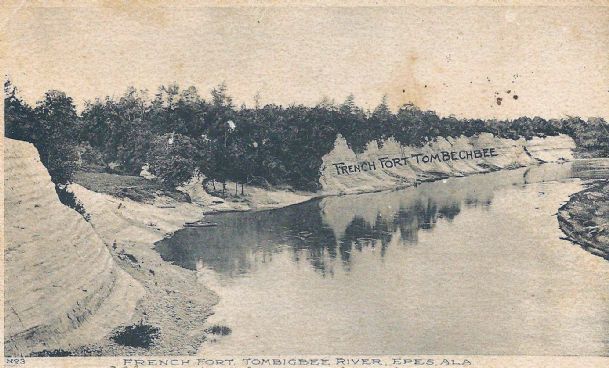More so than any other single question, I am asked about the origin of local names. What does Tombigbee mean? What is West Point west of? What does the Military Road have to do with the military? Our region abounds in interesting names. I will try to shed some light on a few of them.
The earliest reference to the Tombigbee River was in the narratives of Hernando de Soto’s December 1540 encounter of the river. The Spanish called it the River of the Chicaca (Chickasaw). Though many books say the name Tombigbee came from a Choctaw word meaning “coffin maker” that apparently is not the case. In 1805 Mississippi Territorial Judge Harry Toulmin wrote that the name “Tombigby” came from the Choctaw word “Elomegabee” which meant “box maker.” Pontotoc Land Office draughtsman Edward Fontaine wrote in 1848 that about 1730 the Choctaws began calling the River “Itta-ombee-aye ika-abee” or wooden box making river. He explained the boxes were for shipping furs. In 1736 the French had built a fort they named Tombecbe on the river about 75 miles south of present day Columbus.
Though I have never read a period account of where the name West Point came from, a version I heard years ago makes perfect sense. By the late 1840s a community had sprung up that is now West Point. As it was on what was then the western edge of Lowndes County, the community was named West Point and was functioning as a town by 1851. In the early 1870s portions of four surrounding counties were broken off and combined to make what is now Clay County, with West Point as the county seat.
Andrew Jackson’s Military Road ran from Nashville to New Orleans and was completed in 1820. The story goes that Jackson passed through Columbus on the road traveling to the Battle of New Orleans. The road was constructed after the War of 1812 had ended and there is no evidence Jackson ever set foot on the part of the road where Columbus was established. Jackson ordered the road’s construction and was instrumental in getting congressional approval. That is why the road was named after him.
On the road from Columbus to Aliceville, Ala., the highway crosses a creek named Coal Fire Creek. The problem is, that was not the real name of the creek. Its original name was Cold Fire Creek. Early settlers crossing the creek during the winter around 1818 or 1819 described the water as being so cold that it burned them like it was on fire when they crossed it. So, they named the creek Cold Fire Creek. Years later people thought that name made no sense and as the story goes they changed the name thinking it must have been associated with a fire in the north Alabama coal region in which the creek’s headwaters originated.
In northeastern Lowndes County there is an old road now named Wolfe Road. That name is another example of people either not knowing or appreciating history. It is one of the oldest roads in the area and in 1872 W E Gibbs told the story behind its name: “That part of our county lying between the present John Darnell and Goshen places was then ‘veritably a howling wilderness,’ being made so by innumerable bands of predatory wolves, so numerous that the rearing of stock was an impossibility. The Wolf Road took its name from this fact.”
The story of how Columbus got its name is a very simple one but again shows how historic names change. In 1817 Sils McBee settled on a creek just east of Luxapalila Creek. The creek soon took his name. As more settlers arrived during the summer of 1819 and established a town at the Military Road ferry crossing of the Tombigbee there was a meeting of the new residents. McBee suggested the new town be named Columbus and by December of 1819 the new community was officially referred to as Columbus. However, the name of McBee’s Creek did not survive. Somehow it became corrupted to its present name of Magby Creek.
Names preserve a place’s story and history. When stories are forgotten or history lost, a little piece of our past disappears and our sense of place is diminished.
Rufus Ward is a Columbus native a local historian. E-mail your questions about local history to Rufus at [email protected].
You can help your community
Quality, in-depth journalism is essential to a healthy community. The Dispatch brings you the most complete reporting and insightful commentary in the Golden Triangle, but we need your help to continue our efforts. In the past week, our reporters have posted 46 articles to cdispatch.com. Please consider subscribing to our website for only $2.30 per week to help support local journalism and our community.



